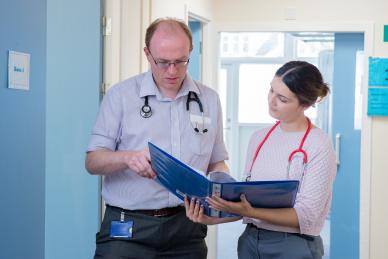Podcasts & Events
We host events on Palliative Medicine and other related fields throughout the year. Visit our events programme to find out more. Listen to Dr Ralston talk with Dr Imogen Smith about palliative care in hospital inpatients.
Empowering medical excellence, shaping healthcare futures.
A medical specialty that provides holistic supportive care for patients with a shortened life expectancy, due to advanced non-malignant disease, or cancer.
See ‘pros’ above! I’ve always really enjoyed the human interaction element of my job, and that really is at the core of palliative care. I also really value the fact that I have time built into my day to spend with patients and relatives. I have the impression that this is difficult to find in other specialties.
Being able to look after the whole patient, rather than one system; it is probably one of the few remaining general medical specialties that does this
Having time to address issues important to the patient
Helping to ease distressing symptoms (and optimise quality of life) throughout a patient’s disease trajectory, not just in the terminal phase
Facilitating dignity and comfort at the end of life
Building effective working relationships with a wide range of professionals
Ample opportunity to educate staff about the benefits of symptom control and the purpose of palliative care
Can be emotionally distressing, and the support of colleagues is invaluable
Not being the primary specialty coordinating a patient’s care can be challenging – particularly when there are differences in professional views, for example, with regard to prognosis and goals of care
Lots of advice given over the telephone, without direct review of a patient, so being able to synthesise relevant information, to facilitate giving advice, is vital
Dr Fiona Finlay - ST6.
" I’ve always really enjoyed the human interaction element of my job, and that really is at the core of palliative care."

No two days are exactly the same, but an average day includes lots of patient contact, either reviewing patients all over the hospital, or in a hospice, interspersed with seeing patients in clinic, as well as meeting with patients’ families and carers. It often includes teaching and education of different specialties and multi-disciplinary groups. There is often a lot of contact with medical and nursing professionals in the community, giving advice about symptom relief, as well as advice about drug conversions and doses. Both in the hospice and in the hospital there are weekly multi-disciplinary meetings to discuss the physical, social, psychological and spiritual needs of patients we have been involved with.


Exposure to the specialty early is a must – particularly as there are not many jobs in palliative medicine before ST3 level
Doing a ‘taster’ week in FY2 is helpful
Consider joining the Association for Palliative Medicine as an Associate member
Keep an eye out for palliative care study days – there’s usually an RCPE event every year, for example
Speak to as many people working in the specialty as possible – those who work in hospices as well as those who are based in hospital, as there are a few key differences as well as lots of similarities in their roles
Any involvement in palliative care audit or other projects will give more insight into the job
Passing MRCP(UK) is essential
A four-year programme involving time in a hospice, a period in the hospital palliative care team, community palliative care experience and exposure to other specialties that link closely with palliative medicine, such as anaesthetics and chronic pain and oncology, as well as time spent with specialties including renal medicine and cardiology (in particular, those with advanced renal failure and heart failure), to increase competence in addressing symptoms in organ failure.
Specialty Certificate Examination in Palliative Medicine, usually sat in ST5.
In principle, this is supported by the Training Programme Director and the Postgraduate Dean, though each trainee’s request is considered individually. Opportunities for research both in programme on a part-time basis (Masters in Public Health/Palliative Care Research, Dundee University) and out of programme (OOP), are available (there are currently trainees pursuing both of these avenues).

We host events on Palliative Medicine and other related fields throughout the year. Visit our events programme to find out more. Listen to Dr Ralston talk with Dr Imogen Smith about palliative care in hospital inpatients.